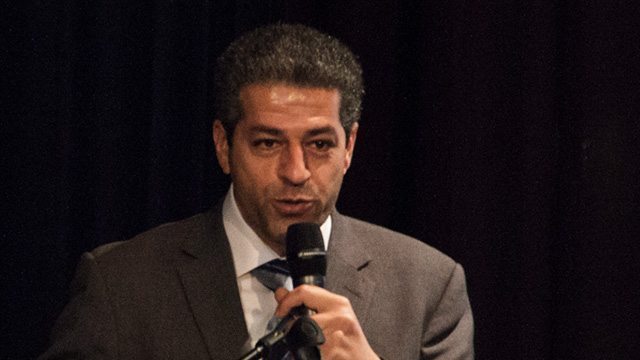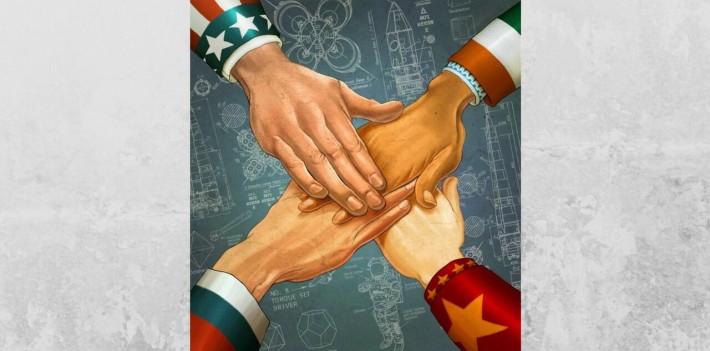The following list of elected officials, scientists, professors, military leaders, musicians, authors, labor leaders, and more have endorsed the Schiller Institute’s petition, The Leaders of the United States, China, Russia, and India Must Take Action! To read the full petition, or add your own signature, click here.
Elected Representatives – active or former federal, state, and local elected officials
Government Officials – active or former military, diplomats, ambassadors, etc
Organizational Leaders – leaders in labor, agriculture, industry, and business organizations
Political, Religious, or Social Leaders
Leaders in the Arts and Sciences – scientists, technologists, professors, and musicians
We, the undersigned, appeal to President Trump, President Putin, President Xi Jinping and Prime Minister Modi, to convoke an emergency summit in order to create a New Bretton Woods global monetary system.
Elected Representatives
(active or former federal, state, and local elected officials)
Senator Richard Black (USA) • Sitting Virginia State Senator (Republican, District 13)
Hon. Gianni Tonelli (Italy) • Sitting member of the Italian Chamber of Deputies, Lega Nord party
Prof. Ivo Christov (Bulgaria) • Sitting Member of the Bulgarian parliament for the Socialist Party, member of the Foreign Policy, and Science and Education committees
U.S. Senator Mike Gravel (USA) • Two-term Democratic senator for the state of Alaska (1969-1981); famously read classified Pentagon Papers at a Congressional hearing to expose failure of the Vietnam War policy
Dr. Natalia Vitrenko (Ukraine) • Chair of the Progressive Socialist Party of Ukraine; member of parliament with the Socialist Party of Ukraine (1995-1998) and then with the Progressive Socialist Party of Ukraine (1998-2002)
Congressman Cornelius Gallagher (USA) • Democratic Congressman representing New Jersey (1959-1972)
Viktor Marchenko (Ukraine) • Former member of parliament, Progressive Socialist Party of Ukraine
Dr. Kirk Meighoo (Trinidad & Tobago) • Former Senator, Trinidad & Tobago; member of the advisory board of the Caribbean Integrationist
Senator William “Bill” Owens (USA) • Former Massachusetts State Senator (1975-1982, 1989-1992), Democratic party
Souad Sbai (Italy) • Former member of Italian National Parliament
Commissioner Robert Van Hee (USA) • Sitting County Commissioner, District 4 Redwood County, Minnesota
Councilwoman Elena Fontana (Italy) • Former City Councilwoman, Italia-Montichiari (Brescia)
Mayor Henry Gonzalez (USA) • Former Mayor of South Gate, California, founder and former President of the Labor Council for Latin American Advancement
Guy N. Martin (USA) • Former Mayor pro tem of Conroe, TX; Attorney in TX; Former Financial Advisor for AG Edwards
Government Officials
(active or former military, diplomats, ambassadors, etc)
General Edwin de la Fuente Jeria (Bolivia) • Former Commander-in-Chief, Bolivian Armed Forces
Dr. Julio C. Gonzalez (Argentina) • Former Technical Secretary to the Argentine Presidency
Major General (ret) Kostas X. Konstantinidis (Greece) • Co-founder of the Non Governmental Organization “Amphiktyonia of Ecumenical Hellenism”
Alain Corvez (France) • Advisor on international strategy
James George Jatras (USA) • Former diplomat; former adviser to Republican Senate leadership
Jacques Bacamurwanko (Guinea) • Former Ambassador of Burundi to the USA; now serving as Capacity Building Expert (Chef du Département “Suivi-Evaluation”) National Capacity Building Secretariat in Guinea
Ambassador Leonidas Chrysanthopoulos (Greece) • Former ambassador; former Secretary General of the Organization of the Black Sea Economic Cooperation
Vasant Bharath (Trinidad & Tobago) • Former Minister of Trade, Industry and Investment
Organizational Leaders
(leaders in labor, agriculture, industry, and business organizations)
Daisuke Kotegawa (Japan) • Research Director, Canon Institute; Former Executive Director for Japan IMF
Dr. Walter Formento (Argentina) • Director, Center for Economic and Political Research
Jean-Pierre Gerard (France) • Former member of the Council of Monetary Policies of the Banque de France; entrepreneur
John Lampl (USA) • Vice-President (retired) of the AFL-CIO, North Dakota; former District President of North Dakota Democratic Party
Rich (John R) Anderson (USA) • Former director of the National Cattlemen’s Association; former member of the Texas Republican Executive Committee; former County Chairman of the Republican Party
Trustee George Bioletto (USA) • International Association of Machinists, Long Beach, CA
Francis Kelly (USA) • Farm Bureau in Wyoming; county chair in the Republican Party
Tate Ulsaker Nelson (New Zealand) • International Trade Consultant; founder of Direct Info
Denys Pluvinage (France) • President of Apopsix Editing company
Jean-Michel St. Jean (USA) • Haitian National Congress, Inc.
Political, Religious, or Social Leaders
Helga Zepp-LaRouche (Germany) • Founder of the Schiller Institute; founder and chairwoman of the German Bürgerrechtsbewegung Solidarität party (BüSo) (Civil Rights Movement Solidarity)
Fouad Alghaffari (Yemen) • Head of the Preparatory Committee of the New Silk Road Party in Yemen; President of the Yemeni BRICS Youth Cabinet
Reverend Andrew Ashdown (UK) • Anglican Priest; author, The Very Stones Cry Out; leader of the first British community group to visit Aleppo following the beginning of the Syrian conflict
Ellen Brown (USA) • Attorney; chairman of the Public Banking Institute; author of twelve books, including Web of Debt and The Public Bank Solution
Ali Rastbeen (France) • President of the Geopolitical Academy of Paris
Chris Fogarty (USA) • Former Vice President of the Friends of Irish Freedom; author of The Mass Graves of Ireland: 1845-1850 and Ireland 1845-1850: the Perfect Holocaust, and Who Kept it Perfect
Fred Huenefeld, Jr. (USA) • Louisiana State Democratic Party Committee
Jacques Cheminade (France) • President of Solidarité et Progrès
Tom Gillesberg (Denmark) • Chairman of The Schiller Institute in Denmark
Liliana Gorini (Italy) • Chairwoman of Movimento Internazionale per i Diritti Civili – Solidarietà (MoviSol)
Antonio “Butch” Valdes (Philippines) • Founder of the Philippines LaRouche Society; Initiator of the Citizens National Guard, Philippines
Ramasimong Phillip Tsokolibane (South Africa) • Leader of LaRouche South Africa
Abdus Sattar Ghazali (USA) • Editor, American Muslim Perspective; former News Editor of Daily News, Kuwait; former correspondent of Associated Press and the Daily Dawn of Pakistan
Michael P. Collins (USA) • Author of Saving American Manufacturing and The Manufacturer’s Guide to Business Marketing; writer for Forbes Magazine and Industry Week
George/Vladislav Krasnow (USA/Russia) • Russian American Goodwill Association
Mike Robinson (UK) • Editor, UK Column, Plymouth, UK
Dr. James Hufferd, (USA) • 911 Truth Grassroots Organization, Adel, Iowa
Mary Sullivan (USA) • Irish American activist, Chicago, Illinois
Leaders in the Arts and Sciences
(scientists, technologists, professors, and musicians)
Dr. Eduardo M.A. Peixoto (Brazil) • Ph.D. and Prof. of Chemistry, University of São Paulo; former Superintendent of Technical Consultancy, Nat’l Development Bank (BNDES); former Brazilian representative to WHO
Dr. Jorge Alberto Montenegro (Argentina) • Professor of International Trade, FASTA University
Professor Bong Wie (USA) • Vance Coffman Endowed Chair Professor of Aerospace Engineering at Iowa State University; founding director of the Asteroid Deflection Research Collaboration
Prof. Dr. Jürgen Knorr (Germany) • Professor of Nuclear Energy Technology, Technical University of Dresden (TUD); Director of the Institute for Energy Technology of the TUD; President of the Kerntechnischen Gesellschaft; Board Member of the German Atomic Forum; Board Member of European Nuclear Society
Gian Marco Sanna (UK) • Founder of the Geminiani Project, focused on restoring the original classical music tuning of 432 hz; leader of the Camerata Geminiani
Dr. Rainer Sandau (Germany) • Technical Director Satellites and Space Applications, International Academy of Astronautics (IAA)
Chief Scientist Wayne Moore, Ph.D (USA) • Accel Algorithmics; NASA (ret.)
Tom Wysmuller (USA) • NASA (ret.); meteorologist
Professor Lilya Takumbetova (Russia) • Retired Associate Professor at Bashkir State Pedagogical University
Professor Cathy M. Helgason, M.D. (USA) • Retired Professor of Neurology University of Illinois College of Medicine, Chicago, Illinois
Roger Boyer (USA) • Retired principal science and engineering technician at the Stanford Linear Accelerator (SLAC)


















